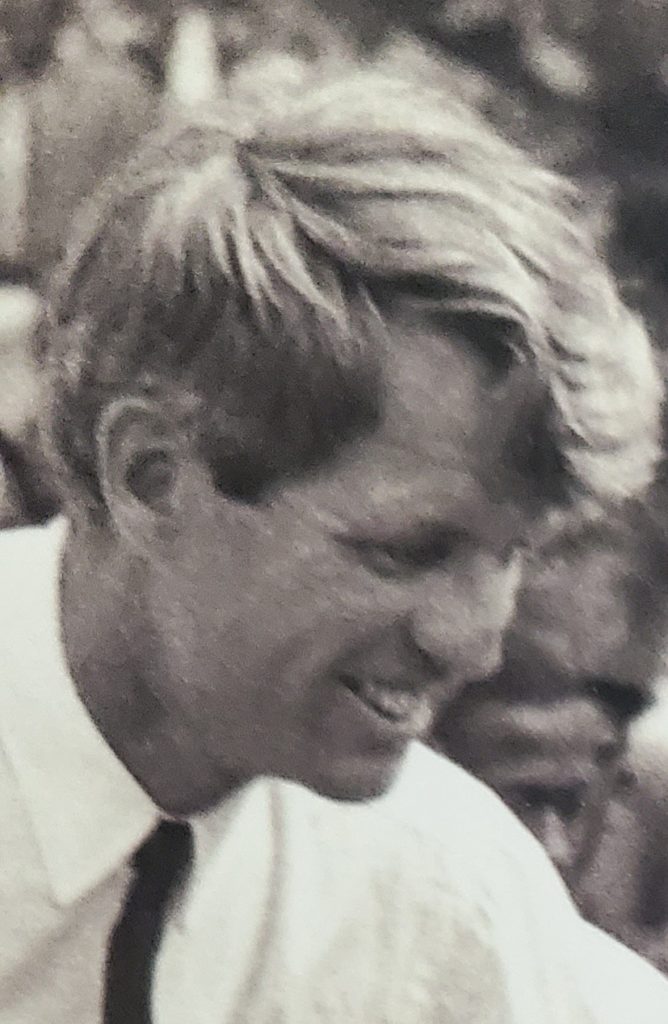I was nearly fifteen years old when Senator Robert F. Kennedy was assassinated. Once again, it felt like the world had come to a complete stop. We were in shock and disbelief. For years, he stood in the shadows of his older brother, President John F. Kennedy, but his presence was well known in the Black community. As his brother’s Attorney General, he was involved in civil and human rights. According to an article in the entertainment section of Jet Magazine, he made a speech before the annual convention of the Theatre Owners of America; he talked freely about the pending civil rights law. He spoke about how many theatres were desegregated throughout the Southern and border states. Said he, “ Those of us who are white can only dimly guess at what the pain of racial discrimination must be- what it must be like to be turned away from a public place, or made to use only a segregated portion of that place, for no reason other the color of one’s skin. How can a Negro father explain this intolerable situation to his children? And how can children be expected to grow up with any sense of pride in being American.”
He supported strong civil rights bills, better education, better employment opportunities, better housing and more enlightened social attitudes. He felt those things would end the bitter unrest that posed a threat of disorder within our society. He came from a family wracked by tragedy but he was not afraid to speak out against injustice.
On March 16, 1968, he stood in the marble-walled Senate Caucus Room where, eight years earlier, his brother John had announced his candidacy for president. He was now doing the same. He was forty-two years old and ready to take on the world. He said, “I run because I am convinced that this country is on a perilous course and because I have strong feelings about what must be done-and I feel that I’m obliged to do all that I can.” He wanted to seek new policies to end the bloodshed in Vietnam, close the gaps between black and white, rich and poor, young and old, in this country and around the world. He wanted his Democratic party and the United States to stand for hope.
Robert F. Kennedy, or Bobby, was his parent’s third son. He was a decade younger than Joe, Jr. and eight years younger than John. Four sisters were between him and John. He was from an Irish Catholic family and had a shared past with Black people. When the Irish came to the United States, they were also discriminated against. Even though he was from a rich family, young Bobby was haunted by the history of his ancestors and his parents. They had rich Protestant neighbors but were rejected socially. They moved from Massachusetts to New York because they felt the rich society discriminated against them.
After serving as Attorney General from January 1961 to September 1964, he was elected to the United States Senate. He served from January 1965 until he was assassinated in June 1968. As a senator, he raised awareness of poverty, sponsored legislation to lure private business to blighted areas, and was an advocate for human rights and social justice. In 1968, he became a leading candidate for the Democratic nomination for the presidency. His main challenger was Senator Eugene McCarthy,
Bobby was well-liked by the Black community, Mexican-Americans, and young college students. He spoke in Spanish to Mexican Americans, sang We Shall Overcome with the Black people of Watts, and fought for men and women everywhere. In the last hours before the polls closed, a late surge of votes from minorities had pushed him to victory in California.
Many Black celebrities supported him in his campaign. His wife, Ethel, was his biggest supporter. In 1963 and 1964, she headed a committee which raised funds to provide jobs for Black teenagers who lived in ghettos. She pioneered large scale benefit committees for Black and white people. She became another widow of violence when her husband was killed.
Shortly after acknowledging his victory in the California Democratic primary, two bullets took the life of the man whom many thought had the greatest potential for leading the nation through one of the most complex times in its history. After his death, integrated members of the famed Green Berets stood vigil over his body in St. Patrick’s Cathedral in New York City.
People of all races and ages reacted with shock and grief to his murder. He will always be remembered as a strong advocate for civil rights and a friend of Black people.
Francie Mae. August 28, 2022.
References
Jet Magazine. Vol. XXXIV. No 11. June 20, 1968. Johnson Publishing Co., Inc. Chicago, IL.
Matthews, Chris. 2017. Bobby Kennedy-A Raging Spirt. New York, New York. Simon & Schuster.
